Eritrea: Part III - Deciphering the Peace Accord between Eritrea and Ethiopia - An Interview with Yosief Ghebrehiwet
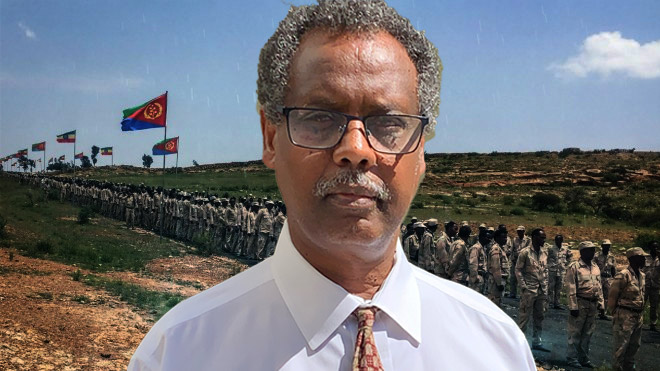
Deciphering the Peace Accord between Eritrea and Ethiopia
Part III
An Interview with Yosief Ghebrehiwet
In part II of this email-based interview with Yosief, he delved into the politics of destabilization. He believes the perpetual destabilization of Ethiopia is central to Isaias’ survival strategy.
We asked Yosief three additional questions to which he provided comprehensive rejoinders. Per his request we are publishing Part III in its entirety.
- The bilateral summit that took place on 8-9 July 2018 in Asmara, Eritrea, between Eritrean President Isaias Afwerki and Ethiopian Prime Minister Abiy Ahmed and officials from the two countries was supported by the United nations, African Union, European Union, the Holy See (the Vatican), USA, UK, Germany, France, China, Russia, Japan and more. Are these institutions and countries seeing something we cannot see? In other words, are our idiosyncrasies on the way in seeing the peace agreement clearly?
- You stated, “Eritrea is a totalitarian regime that cannot survive in an ‘opened up’ environment.” Alex DeWaal, an academic with expert knowledge on the Horn, stated, “Peace poses more of a challenge to Isaias’ legitimacy than war, and fear of war, ever did.” Do you think PM Abiy is aware of this conundrum? If yes, why is he simply spinning his wheels?
- As Isaias moves along a zigzag course the PFDJ too are running in zigzags around his playground. Why?
Yosief asked us to further elaborate on the question. We wrote back by including the following paragraph ...
“For 18 years [before the signing of the peace accord between Eritrea and Ethiopia] the incessant argument of Isaias Afwerki, his close associates and his followers started and finished with the condemnation of Ethiopia. Those “arguments” were used as morning and evening rites. The crescendo of such hatred was so much a generation of Eritreans grew up hanging on to such rhetoric. When PM Abiy came to power Isaias made a 180 degree turn in this logic, so much so he kowtowed to Abiy. Although his followers (PFDJ) were aware of the impact of the two-decades long empty rhetoric, they were first stupefied by the new developments and then, as if under hypnosis, it did not take them long to sing from the same hymn sheet. No one dared to express his/her own opinion. Such zigzagging attitudes defy logic. Can you explain the rationale behind such blind fellowship?”
I think these three questions could be collapsed into one: how the various entities mentioned above – (a) the outside world [UN, EU, AU, Germany, etc], (b) PM Abiy Ahmed, and (c) the Shaebia foot soldiers – have reacted to the Isaias regime’s response to the emerging Peace Deal. I will add two more to make the list complete: (d) the TPLF (or the Tigray leadership) and (e) the Eritrean Opposition. What unites all of these actors is that they do NOT know the nature of the Isaias regime; at least, not to the extent that they should. So far, nothing in their actions shows us that they are fully aware of Shaebia’s true nature; that is, of what drives it in whatever it does. In this part of the interview, I will confine myself to PM Abiy’s response, since that happens to be the most indispensable one.
Among all the actors mentioned above, Isaias happens to be the most consistent one. He might seem to be zigzagging in his actions; but if so, it is only in the means he employs and not in the end goal itself. The actual zigzagging is to be witnessed among the responders, who keep reacting to the various means he employs to get what he wants rather than to his ultimate goal. Among all the ceremonies, euphoria, visitations, meetings and signings associated with this peace process, the only question that Isaias has been consistently asking himself is: how do I survive it? So has been with Shaebia: how do I exploit this peace deal offered by Ethiopia to extend my political life no matter what? Everything else, including the much-anticipated border demarcation, is a means geared towards that end. None of the actors mentioned above are responding to this vital question of survival that haunts Shaebia in whatever it undertakes.
Thus, it is important that we first understand the true nature of Shaebia that the above mentioned actors have missed before we look at their responses, mostly misguided (not all, though).There are three vital components to this query on the nature of Shaebia: (a) What has been, and still is, Shaebia’s ultimate goal or drive in whatever it does? (b) How does it relate to its subjects to attain and maintain that goal? (c) And, how does it relate itself with relevant actors in the outside world (and, hence, outside of its control) in order to attain the same goal? Let’s now look at each of them:
(a) Goal: self-preservation at any cost
If there is a single goal that Shaebia has pursued relentlessly in its mieda and post-independence years, it is this: self preservation at any cost. The advantage Isaias (and Shaebia) has had in this survival game is that he has never been beholden to any cause, ideology or principle that might interfere with this original intent. All the “causes” that Shaebia professed to have had at one time or another – communism, revolution, nationalism, constitution, martyrdom, sovereignty, independence, demarcation, etc – have all been employed as various means to attain that goal, and that goal only. The evidence to this is that once these “causes” serve their purpose, none of them leave any trace in the system itself. For instance, once it dropped its communist rhetoric, not the slightest trace of its leftist past is to be found in whatever it says or does. Among the tens of thousands that made it from mieda to independent Eritrea, you wouldn’t find a single teghadalay conversant in leftist ideology.
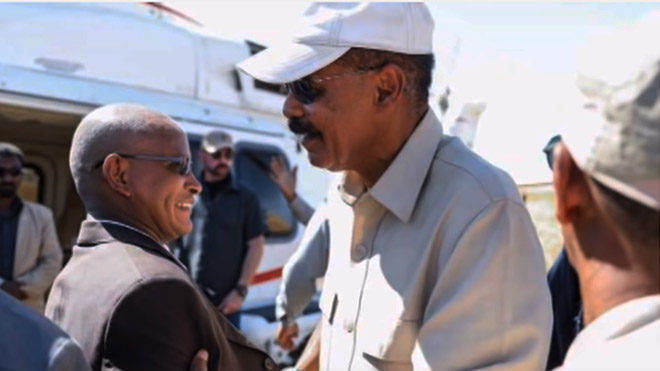
That this survival mechanism has served Isaias/Shaebia well – and invariably, at the expense of the Eritrean masses – can be gleaned from the long list he/it has out-survived so far: Jebha, Menkae, Yemin, Falul, G-15, Haile Selassie, Menghistu, Melles, Hailemariam, TPLF’s hegemony, etc. And now the question it asks itself is: how do I out-survive TPLF in Tigray, EPRDF, PM Abiy, and Ethiopia (as one nation)?
We see the senseless of this drive to out-survive anybody and everybody in its reach for survival sake when it is aimed against Eritrea itself; which tells us that the drive has been rendered so blind that it has no mechanism to differentiate a friend from foe. In this survival game, Eritrea – and its people – has always been considered a fair game; after all, holding the Eritrean masses hostage has been Shaebia’s main survival strategy in the last 20 years or so. In this, it is obvious that it is not Shaebia that has been sacrificing itself for Eritrea, but Eritrea that has been being asked to sacrifice itself for the survival of Shaebia. Odd as it may seem, Shaebia, in its last days, is fighting hard to out-survive Eritrea. How did this come about?
The danger of self preservation at any cost is doubly destructive in the totalitarian context because it eventually evolves into a purely parasitic relation between the organization/party and the nation. In order to have full blown parasitic existence, Shaebia had to gradually evolve into a distinct entity entirely separate from its host, the Eritrean body. In this process of separation, which started all the way in mieda, it has finally managed to develop its own skin immune to the pain of its host. And the more detached it gets from the Eritrean body, its appetite grows by that much to sustain “its separateness” or “its sovereignty,” eventually evolving into an entity with a voracious appetite that can be made to halt only with its own or its host’s death, or both. That is to say, with Shaebia (the parasite) getting ever-bigger than Eritrea (the host), it has developed such a huge appetite the small nation can no longer provide. Paradoxically then, it is in the very process of getting its independence – that is, independence from Eritrea – that Shaebia is killing Eritrea.
In the past two decades, Shaebia, in its relentless pursuit for parasitic sustenance, has hollowed out the nation economically, socially, politically and, above all, demographically to a level never witnessed before. When it comes to the Warsai generation, Shaebia’s existential question has always been “It is either us or them”; singling out this population group as the most threatening to its existence. In its quest for total control, first, they were herded out from urban centers, towns and villages and, then, cordoned off in the wilderness to serve both as trench-soldiers and slave-laborers for years on end. Most of the nation’s prisons are now filled with Warsai: conscription evaders, army deserters and dissenters weeded off the army. In an endless and continuous purge, it has forced hundreds of thousands of them to flee the country. As the hollowing out continues at an alarming rate, the idea that eventually this nation will collapse under its own weight is something that Shaebia cannot contemplate. This is simply because it cannot survive outside of that parasitic existence; it doesn’t have any other alternative than to keep on devouring the insides of the nation for nourishment – it is that biological. It is at the nick of time then, as Shaebia has all but exhausted the internal sustenance it has been relentlessly extracting from the exhausted Eritrean body, PM Abiy has arrived on the scene to save Shaebia from itself; that is, with the promise to supplement its parasitic sustenance from outside.
(b) Total control: how Shaebia relates to its own people
To fully grasp the true nature of Shaebia, not only should we look at what drives it in whatever it does, but also at what it does – that is, the means it employs – to attain that singular goal, both in relation to its people and to the outside world.
Let me start with the former: in its perennial quest for self-preservation at any cost, how does Shaebia relate itself to its people? In its quest for total control over the population – over their bodies, their minds and whatever they possess – it relates to them through totalitarian terror. To undertake this social experimentation though, the nation (that is, the laboratory) has to be sealed off from the outside world first, both physically and economically. While the physical isolation of the nation is meant to be attained by hermetically sealing off the borders through draconian security apparatus, the latter is meant to be attained through a discredited philosophy of “self reliance” that all totalitarian systems adhere to. With the laboratory sealed off, the regime would be able to conduct all kinds of experimentations of control on its people, the most notorious of which has been the indefinite National Service.
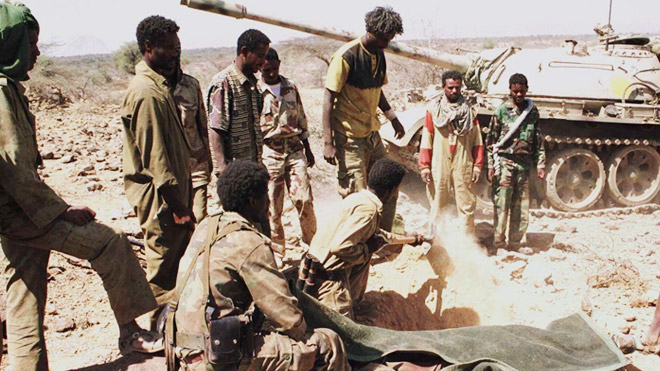
The indefinite National Service is a good example on how the Isaias regime intends to have total control over the bodies and minds of hundreds of thousands of youth. Not only were they subjected to years of menial service, doubling as soldiers and laborers, with little or no pay, they were also brutally regimented and indoctrinated in the attempt to mold them in the image of teghadalay. And with the further monopolization of the Eritrean economy by Shaebia that the sealing off of the nation allowed, the dispossession of the masses has been complete.
That this social experimentation has spectacularly failed is to be seen in the hundreds of thousands who have left the country for good. For Shaebia though, there is no other alternative but to doggedly pursue along the same course. To abandon this experimentation and allow the masses to lead normal lives, with the youth left alone in cities, towns and villages across the nation to thrive and prosper, is to bring its own self-preservation to an abrupt end. That is why, even as the nation – and the military – is being hollowed out to a level that is no more sustainable, Shaebia cannot be weaned out of its parasitic existence.
(c) Unprincipled pragmatism: how Shaebia relates to the outside world
It is obvious that Shaebia cannot treat the outside world the same way it does its own helpless people trapped inside Eritrea simply because it has no control over the former. It has no choice but to go “pragmatic” in its dealings with the outside world. Nevertheless, it remains to be an odd kind of pragmatism; confrontational and destabilizing in its ways, especially when applied to the neighboring countries. If there is a phrase that describes Shaebia’s foreign policy aptly, it would be: vulgar or unprincipled pragmatism. Once, I defined this kind of pragmatism a follows (Eritrea: Tewahdos’ Complicity in the Demise of their Church; 05/13/2010):
“Shaebia is very much known for its vulgar pragmatism, but pragmatism nevertheless. It is vulgar because whatever it does through it is guided by no higher economic, social, cultural, ethical, political or ideological principle. The single objective of this pragmatism always remains the same: self-preservation above anything else. The organization has no allegiance whatsoever to anyone; least of all, to its own people. The means of achieving this objective is: whatever it takes. The only inhibiting question that it asks in pursuing this objective is: can I get away with it? In the process of doing so, nothing else matters, not even the existence of the nation.”
Even as this “foreign policy” remains primarily confrontational in its nature, it is applied on the ground pragmatically (“Can I get away with it?”). War, terrorism, blackmail and outright opportunism have been applied numerous times on the neighboring countries to get what the Isaias regime wants. It has used war against all its neighboring countries – Ethiopia, Sudan, Djibouti and Yemen – when it believed it was the only way it could get what it wanted. And, at one time or another, virtually all insurgent groups in the region – in Ethiopia, Sudan, Somalia, etc. – have been armed by the Asmara regime. True to its unprincipled pragmatism though, there has been no humanitarian or ideological drive behind this numerous supports. When it helped insurgents in South Sudan, it was not driven by some pan-Africanist cause against the Arab North; when it armed the Al Shabaab in Somalia, it was not because it shared their religious zeal; when it briefly sided with the Darfur cause, it was not for humanitarian reasons; when it armed various ethnic groups in Ethiopia, it was not because of ethnic solidarity or similar other grievances; etc. In short, it is through their actual or potential destabilization that Shaebia talks to its neighbors to extract all kinds of concession.
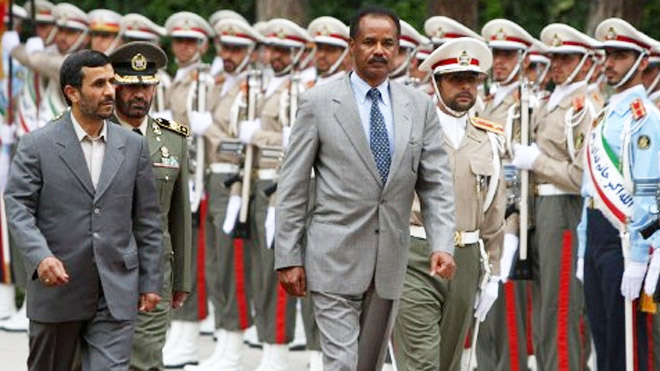
Yemen is a good example where the “cause” doesn’t come to the picture at all as Shaebia keeps switching sides. At the beginning, Eritrea was siding with Iran and became a conduit of arms to the Huthis simply because at that time Iran was the only nation willing to pay for that kind of service. But as soon as Saudi Arabia and the Emirates outbid the Iranians, it didn’t take much soul searching for the mercantile Shaebia to switch sides. This is because neither the Sunni nor the Shea, nor any other cause factor in Shaebia’s calculation for self-preservation; money, though, does big time in this case. The fact that millions were starving and thousands were dying in this unjust war against Yemen is something that doesn’t make even a blip in Shaebia’s “moral” radar.
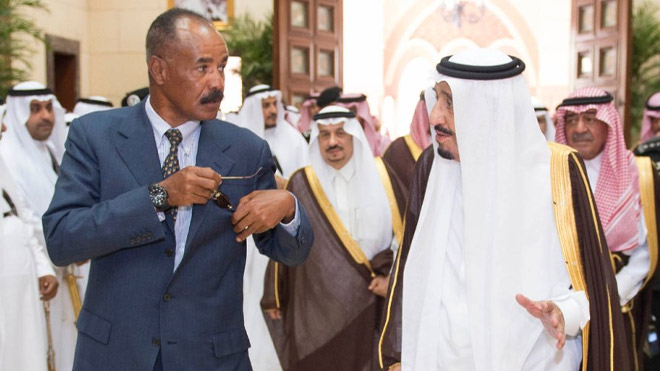
A good example of a victim nation that has tested terrorism both in its violent and blackmail form is Sudan. All the insurgents in Sudan – from South Sudan (SPLM), East Sudan (the Beja, Rashaida and other insurgents) and West Sudan (Darfur and others) – have been at one time or another fully sponsored by Eritrea. And whenever it intermittently makes “peace” with Khartoum, it uses the threat of violence to get various concessions from this vast, sprawling country with a plethora of intractable problems. That is one of the main reasons, by the way, the Isaias regime has been acting with impunity in the eastern part of Sudan (especially in regard to Eritrean refugees); at one time, this area has almost been acknowledged by Khartoum as Shaebia’s territory of influence.
Shaebia is like that hardened criminal impossible to rehabilitate into society. Having no other talent, he easily falls back into his old ways for survival. Similarly, when invited by the society of nations to join them, the only way Shaebia responds is by asking itself: how can I utilize my vulgar pragmatism to get concessions from the neighborhood (especially from Ethiopia, given its similar vulnerability as Sudan)? It has absolutely no other talent by which it could relate to the society of nations.
Now that we have looked at the nature of Shaebia, let’s go back to our original question: what are the consequences of responding to Shaebia in this peace process without factoring in its true nature as expounded above? Below, I will deal with two cases only – the Irob case in Tigray and the religious persecution in Eritrea – to show the consequences of not factoring in Shaebia’s nature in PM Abiy’s response to the Peace Accord. To figure this out, we should ask first, what kind of peace Abiy and Isaias are aiming to achieve.
Peace that bypasses the people
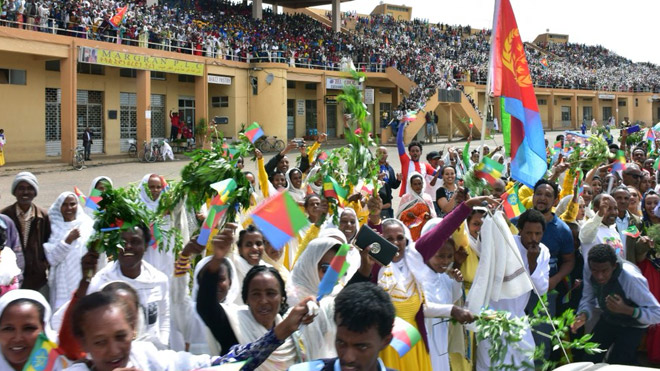
Amidst all the spectacular fanfares, deeply stirred emotions, huge rallies, optimistic speeches, reciprocal visitations and high hopes triggered by PM Abiy’s acceptance of the Peace Accord, it is easy to miss the most critical question that needs to be asked: what kind of peace do the two leaders have in mind? This is because it is easy to imagine two kinds of peace that are in direct contradiction to one another in ways they would be implemented on the ground – one, a normal kind of peace that puts peoples’ interests first; and the other, an abnormal one that entirely bypasses the people.
The normal kind of peace can easily be described as people centered peace: one that restores full blown normalization to the masses, in general, and to those who have been closely affected by the extended “no peace, no war” condition in Eritrea and North Ethiopia, in particular; one that opens up the border wide enough to bring forth people to people interaction in all its aspects – economic (business, trade, labor, tourism, etc), social, spiritual, cultural, etc; one that also paves the way for further regional cooperation, economic integration, mutual development and eventually even the spread of democratization in the region; and, in general, one that directly translates on the ground in tangible improvements in the daily lives of the masses.
The reason why I am reiterating this obvious point is because it is easy to imagine an abnormal kind of peace that entirely bypasses the people in all the normal ways mentioned above: one that is primarily confined to government to government agreements (demarcation, regulated port use, limited trade, etc) and keeps people to people interaction to the barest minimum; one that opens up the border primarily for the flow of goods (instead of the flow of people too, especially in the direction from Eritrea to Ethiopia), and for that, under the monopoly of the regime; one that doesn’t prioritize the welfare of the peoples on both sides of the border, be it in normalization or development; one that would not demand the demobilization of the bloated Eritrean army and the end of the indefinite national service; and, in general, one that leaves the humanitarian crisis in Eritrea as is as part of the deal in order to assure the continuation of Shaebia’s totalitarian grip over its people.
Another way of looking at the problem is by asking whether it is possible to have normal relations with a totalitarian regime whose very existence depends on sealing off the nation from the outside world. Since the key to the implementation of the peace deal on the ground in its fully normal sense is opening up the border wide enough for people to people interaction in all its aspects to materialize, would it possible to do that without destroying the Isaias regime itself in the process? If so, the Isaias regime’s fear fundamentally is that in the very process of fully normalizing relations with Ethiopia, it wouldn’t be able to avoid the normalization that would come back into the lives of its own people. And this is not the normal kind of fear; rather, it is an existential one. For Shaebia’s very existence depends on maintaining the abnormal conditions inside Eritrea; an abnormality that can be sustained not only by constantly destroying the cohesiveness within each and every community in the land, but also by cutting off the many links that hold between these various communities – societal, religious, economic, ethnic, demographic, generational, local, familial, military, education, etc. It is this carefully nurtured abnormality that puts the population in perpetual displacement, without which it would be impossible for the regime to keep it under its totalitarian grip.
The Asmara regime is in a desperate search of the latter kind of peace deal that entirely bypasses its own people, one that is abnormal in all the ways described above. Since there is no doubt what this regime wants given its totalitarian nature, the only question that matters would be whether Ethiopia is willing to accommodate it. Whatever PM Abiy has in mind though, there is no way escaping the irreconcilable mismatch between a system that can only survive in a closed environment and a genuine peace deal that requires opening up for all kinds of normalization to hold. But if the emerging peace deal keeps ignoring this reality for long, treating the Isaias regime as if it is of the normal type, then this mismatch will have real time consequences on the ground that would affect the people in adverse ways: first and foremost, to Eritreans, and second, to Ethiopians. Let me start with the latter, focusing on the Irob case.
Abnormal peace along the border: the Irob case
The consequences of dealing with the Isaias regime as if it is a normal one can be seen in the crisis it has already generated among Ethiopian communities in the border areas. Some nationalists from both sides have invoked the respective nationalisms of the peoples on either side of the border to protest a demarcation that would force people to go to the other side of the border. But this is hardly the case; usually peasants give a damn on which side of a border they end up so far as their normal lives are not disrupted by those imaginary lines. The identity that they worry about most is not the national one, but local; so far as they are not separated from their close-knit local community, they would have tolerated the transaction. In this regard, a good example to look at would be the Irob case.
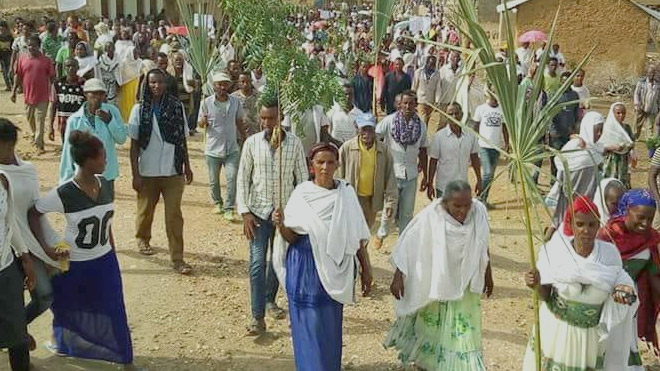
The fear of Irob peasants that continue to live in villages that have been awarded to Eritrea has less to do with nationalism than with the abnormal nature of the nation to which they would be forced to join. First, given that Eritrea has remained sealed off from the rest of the world, once forced to join it, these villages would not be allowed to have normal relations with their larger Irob community on the other side of the border. This is no small matter to a community that is small to begin with, but also with a distinct culture and language. This is at the communal level; much more worrisome is what would happen to their individual liberties.
The Irob villagers realize that as soon as they land on the Eritrean side of the border they will be subjected to all kinds of totalitarian horror that the Eritrean people have been subjected to in the past two decades. After all, their area has been one of the main entry points for Eritrean refugees fleeing their country. They have heard first hand of all the horrors of National Service, where young men and women have been forced to spend their most productive years in penal servitude, both as trench-soldiers and slave-workers; many of them for more than a decade. They have also heard of the traumatic experience that the female Warsai had undergone, being additionally subjected to sexual coercion and rape, some of them returning to their families with HIV, illegitimate pregnancy and mental disorder. Further, they are aware of how these refugees have fared in refugee camps near and far, and the hardships they faced when they ventured further: kidnapping, blackmail, torture, rape and murder in Libya and the Sinai and the thousands that perished in the Mediterranean and the deserts (the Sinai and Sahara). If so, we shouldn’t be surprised at all when Irob parents adamantly refuse to wish all of these biblical pestilences on their children.
Thus, there is absolutely no doubt in the minds of those who live on the Ethiopian side of the border that the Eritrean government is an abnormal one. They know that the primary tool of oppression of this regime is the uprooting and destruction of cohesive communities like their own through an ever-present terror. On the other hand, the leadership in Addis Ababa seems to be oblivious of this fact, knowingly or not. If the authorities are aware that the Asmara regime is totalitarian, then it shouldn’t have come as a surprise to them when the people at the border areas protested vehemently against a peace proposal that would force them to join the traumatized population on the other side of the border.
That PM Abiy’s refusal to factor in the abnormal nature of the Isaias regime in his dealings of the Peace Accord is a huge problem can be seen from the above given example. What makes this doubly worrisome though is that the Prime Minister not only ignores this gross abnormality, but also goes out of his way to paint the Asmara regime as a normal one in the eyes of his people and the world. If so, the question is: if the Addis Ababa leadership has failed to see the abnormality of the Isaias regime in regard to its own people in the border areas that would be adversely impacted by the peace deal in its present form, how plausible is it for it to foresee the negative impact that this would have to the people of Eritrea? Let me give just one example: the ongoing religious persecution in Eritrea.
“Peace” for the religious persecuted
It is rather ironic that the two Ethiopian Prime Ministers (the current PM Abiy Ahmed and the former PM Hailemariam Desalegn), who happen to be followers of Evangelical Churches, were effusive in their praise of Isaias Afwerki while completely ignoring the fate of their fellow Evangelicals in Eritrea. They fail to see that normalizing this abnormal regime will have to necessarily come at the expense of their fellow Evangelicals, among others, in Eritrea.
Unlike Jehovah Witnesses, the Evangelicals have been doing everything that the regime has been asking of them. That is to say, there have been no conscientious objectors or dissenters among them that you would not find among the larger population. Not only did they happily vote in the referendum, they also had no problem serving in the National Service. Yet, it was not long before the regime turned its hostile eyes on them. Given Shaebia’s nature, the reason was rather obvious: the Evangelical Church happened to be the Church that attracted the youth the most. As such, Shaebia saw in the Evangelical Church one of its main competitor for the mind (and loyalty) of the Eritrean youth. The response was drastic; it has been years since all Evangelical religions have been legally banned as illegitimate; all their worshipping places closed for good; many of their leading pastors imprisoned, and their followers disenfranchised. Even when they congregate in small numbers to worship in the confines of their homes, they risk imprisonment if found. Many others found with the Bible in their hands in the National Service have also ended up in prison. As a result, most of them have left the country, and those who remain in the land live in fear of being apprehended for any reason. It seems that both Ethiopian PMs are not only willingly ignoring this huge humanitarian blight, but are also willing to rehabilitate Isaias as a great and humble leader that contradicts that very picture, and thereby exacerbates the plight of Evangelicals in the nation.
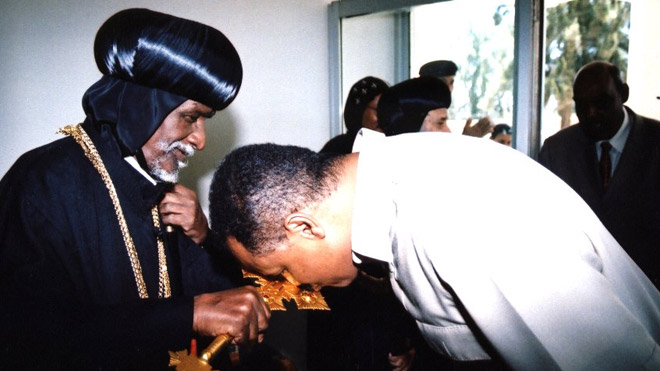
So is it with the case of Patriarch Antonios. It is to be noted that PM Abiy has indeed made a weak effort to reconcile the Tewahdo Church in Eritrea, drawing inspiration from doing the same thing in Ethiopia. Again, this is a typical case where the PM has totally misunderstood the nature of the Isaias regime. To begin with, his comparison with the Ethiopian case is absurd. While in the case of the Ethiopian Tewahdo Church, the PM has offered himself as a neutral third person to arbitrate between two factions, in the Eritrean case it was Isaias himself who created the schism. As in the case of the Evangelicals, it was Isaias who is behind the imprisonment of the Patriarch and other learned and influential Orthodox pastors.
Similar to the Evangelical case, every single move that Isaias has made against the Orthodox Church has been done with the control of the Eritrean youth in mind: First, he arrested the learned clergy that were at the forefront of the reformation of the Orthodox Church, and hence, the driving force behind the youth's newly found interest in the Church. Second, he ordered the closure of the Medhanie Alem Church, which turned out to be a magnet to thousands of youth. Third, he wanted to enlist the clergy to carry firearms, with an eye on the youth serving the church. And, last, he wanted to use the Church as an instrument of containment. In the end, he decided to do away with the Patriarch who was unwilling to meet his totalitarian demands, thus clearly coming in the way between him and the total control of the Eritrean youth he had in mind. Thus, it was precisely because leaving the deposed Patriarch free was taken as political threat to the regime that he was put under house arrest immediately after he was illegally forced to step down. PM Abiy doesn’t seem to have an understanding of the intricacy of the problem; that is, how all this is intimately tied to Shaebia’s strategy of self-preservation at any cost.
Thus, to attempt to solve the Evangelical and Twahdo problems in Eritrea through some kind of “charm offensive” (as one government official seemed to indicate) is to be totally ignorant about the nature of the Isaias regime. Instead of jumping ahead to fully normalize the regime, it ought to have undertaken this normalizing task step by step in tandem with similar steps in reforms taken inside Eritrea. But Eritrea has no intention of loosening the totalitarian grip it has over its people; on the contrary, it is expecting to get substantial concessions from Ethiopia that would cement that totalitarian grip.
Concessions from Ethiopia
The Asmara regime, as always armed with its unprincipled pragmatism (and the politics of destabilization it entails), is looking at the new political landscape that has come to emerge with the Peace Accord, with the intention of getting maximum concessions from Ethiopia in two fronts, both of which are essential to its quest for self-preservation at any cost:
(a) The internal demand: Eritrea should remain sealed off both physically and economically; the total control Shaebia has over its people and the monopoly it has over the nation’s economy should never be put to the test again (as it has been briefly tested when it was forced to open up its borders).
(b) The external demand: to further buttress its self-preservation, the Isaias regime has two gains in mind: political rehabilitation in the eyes of the world and an economic lifeline from outside; both demands without undergoing any meaningful change – be it political or economic – on its side.
These two tasks – political rehabilitation and economic lifeline from outside – are, of course, assigned to Ethiopia. PM Abiy has accepted the normalizing task with all the zeal that Shaebia could hope for, already registering spectacular results. It is yet to bee seen if he is willing to accommodate Shaebia in its economic demand, although it remains optimistic that eventually the PM will have no choice but to accommodate it.
(a) Normalizing the Isaias regime
One of the main roles the Isaias regime wants Ethiopia to play in its quest for “self-preservation at any cost” is that of normalizing it – that is, rehabilitating it in the eyes of Ethiopians and the world as a normal nation – without undergoing any reform on its side to make the lives of its subjects bearable.
We can understand why diaspora Eritreans that support the regime and mining companies working in Eritrea have had little success so far in their normalizing missions; and this is not for lack of trying hard. The blatant conflict of interest that both are involved in makes it difficult for them to be taken seriously by the outside world. But when it comes to Ethiopia, it is a totally different matter: there could be no better character witness than the former enemy or the real victim who testifies under oath that actually the supposedly big crime was a minor one to begin with or even that the alleged crime never took place. PM Abiy’s minimization of Shaebia’s crimes or even outright vindication of its abnormal behavior is indeed playing a great role in this normalizing mission.
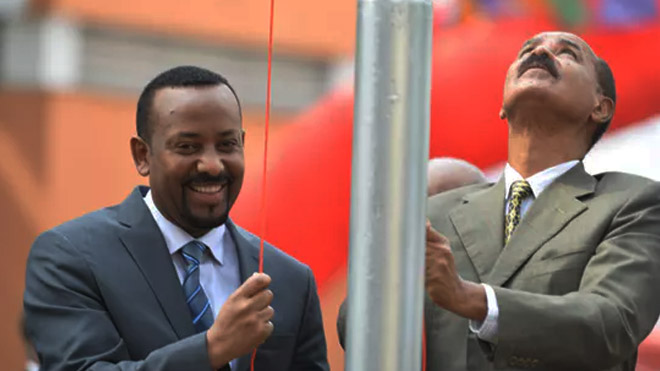
PM Abiy, in a very short time, has done a lot to normalize the Asmara regime than all the others who tried to do so in the last two decades combined. In every opportunity, not only has he hailed Isaias as a great leader and unabashedly romanticized Asmara and Eritrea, he has failed to mention a single flaw to mar that pristine image. He has sold this image so successfully to his people that when Isaias arrived in Addis Ababa, he was met with euphoric adulation that he has not found among his own people for a long time now. [After the macabre show the Addis Ababa audience performed in exalted adoration of the tyrant Isaias – “Isu! Isu!” – the Millennium Hall ought to change its name into a “Hall of Shame”] The irony of this has not been lost on the Eritrean masses; they don’t confuse the love Ethiopians have shown for Isaias for the love of Eritrean people. Anyone who knows the litany of crimes committed by Isaias against his people would be at loss to explain this adulation. Thus, it is easy to see that the normalization of Isaias in the eyes of Ethiopians mediated by none other than PM Abiy himself is coming at a huge expense to the Eritrean masses that will have to endure the brutality of an Ethiopia-buttressed Shaebia rule for more years to come than it would have been otherwise.
And worse yet, PM Abiy’s normalizing task is not confined to Ethiopia; he has taken this mission with irrepressible zeal to the outside world. Already, he has successfully lobbied the UN to lift the sanctions it had imposed on Eritrea. There is no doubt that now the regime is in a shopping binge for all kinds of armaments. The recent unusual military parade show in Sawa, supported by tanks and helicopters, is something that Isaias never dared to do or was incapable of doing before because of the sanctions. So it should be made clear that in case of armed confrontation, it is PM Abiy who made it possible for Eritrea to rearm itself. The PM’s normalizing mission doesn’t end with the UN; he has also been single-handedly selling Eritrea to the neighborhood, IGAD, AU, EU, US, etc. And, again, all of this is being done without the Isaias regime undertaking the slightest bit of humanitarian gesture on its side. All Shaebia is saying is that it has never deserved all the ostracizing in the first place; and hence nothing ought to be done on its side.
The adverse consequences for the Eritrean people will be huge. To give one example: the Israeli government has already responded to this normalizing mission enthusiastically: it wants to restart the deportation of Eritrean refugees. The rationale is since the Eritrean government is being rendered normal – thanks to PM Abity and his supporters – there is no reason for Eritreans to claim asylum in Israel. We shouldn’t be surprised if other nations from Europe would follow the Israeli example. Given the growing irrational xenophobia in Europe, any excuse would do. And more importantly, we wouldn’t know what this unwarranted normalization would eventually do to the huge number of refugees camped in Ethiopia.
Trying to help a neighboring nation, and for that a former enemy, to rehabilitate itself among a society of nations would have been a magnanimous task had it been done in tandem with the nation taking steps to bring normality to its people’s lives – release prisoners, demobilize its bloated army, end religious persecution, allow free press, etc. The realty though is just the opposite: as PM Abiy goes full steam to normalize the Isaias regime, Isaias haven’t even taken baby steps towards that direction. For instance, the lifting off the sanctions could have been tied to demobilization, thereby eliminating any military conflict as an option in the yet to be resolved border issue. Instead, PM Abiy has helped the regime to be fully armed again, unnecessarily adding to the tension in the region.
(b) Economic lifeline from outside
Another concession that Isaias wants from Abiy is an economic lifeline from outside; again, without undergoing any changes in his economic policy of “self reliance”. Shaebia intends to remain fully in control of the nation’s economy within a sealed off Eritrea as it implements the peace deal on the ground: (a) by focusing on Assab as the main point of contact; (b) by offering itself (as opposed to individual Eritrean merchants or businessmen) as the main trade partner in trade with Ethiopia. To this effect the Asmara regime is diligently looking for a point of contact that would not only drastically limit people to people contact, but also allow the flow of goods to mainly pass through the hands of Shaebia.
The greatest card that Isaias has in his hands is Assab. For Ethiopia, gaining access to Assab would be the jewel of the crown in this peace deal. Not only would it be possible for it to have this access at a reasonable cost, it would also break the stranglehold that Djibouti has had over Ethiopia, both in physical and economic senses. Besides, Assab is conveniently situated to serve mehal ager, where the capital Addis Ababa is located. With the rapid industrialization that the nation is undergoing, this couldn’t have come at a better time.
On this case, Isaias would be more than willing to accommodate Ethiopia, provided it agrees to confine its point of entry largely to this city, both for its import/export and its trade with Eritrea. This is because the people to people contact could be kept at the barest minimum in this city. If Assab remains the central focus of Ethiopia, about 99 percent of the Eritrean population would remain outside the orbit of Ethiopian influence. Both the outflow of the youth and the influence of a much more open society would be drastically curbed. And a bonus to all this – as both leaders see it – is that Tigray would remain economically hamstringed.
The income that comes from renting out the ports and providing services goes directly to the coffers of Shaebia, easily bypassing the people in the mainland. And when it comes to trade with foreign countries, Shaebia has already a blue print it has been using for the last two decades. The various Shaebia-owned corporations have been doing all the trade the country needs with the outside world, with almost all the middlemen merchants wiped out in the process. It is easy to imagine these Shaebia-owned corporations venturing all the way to mahel ager doing all the shopping the nation needs – berbere, shiro, teff, coffee, tea, sugar, zuria, beer, factory commodities, all kinds of cereals, etc – and selling to its people at outrageous prices. Focusing on Assab as the main contact point would greatly facilitate this monopolizing task. Whether the Abiy government will accommodate Shaebia in this endeavor is to be seen in the near future.
Conclusion
The main question that Shaebia has been asking regarding the peace deal is: Would it allow my parasitic existence to continue; and, if so, how? Would it allow me to continue living off the Eritrean body? Would it even help me consolidate this parasitic existence by letting me retain most of the gain that comes from this peace deal instead of the Eritrean people? Shaebia would be OK with this deal so far as it doesn’t infringe on the totalitarian grip it has had over the population for the last two decades. In all this strategizing, the Eritrean masses, be it within the nation or outside, and Ethiopia and Tigray are looked at by this alien entity from a neutral equidistance. For Shaebia, these three entities are variables it had to manipulate in order to survive; that is, the Eritrean people to ever-remain under its totalitarian control, no matter what, and Ethiopia and Tigray to be pitted against one another to sustain that control, depending on the ever changing context.
NB. In coming follow ups, I will look at the responses of the other actors: the outside forces, TPLF, the foot soldiers and the Opposition.


![[AIM] Asmarino Independent Media](/images/logo/ailogo.png)